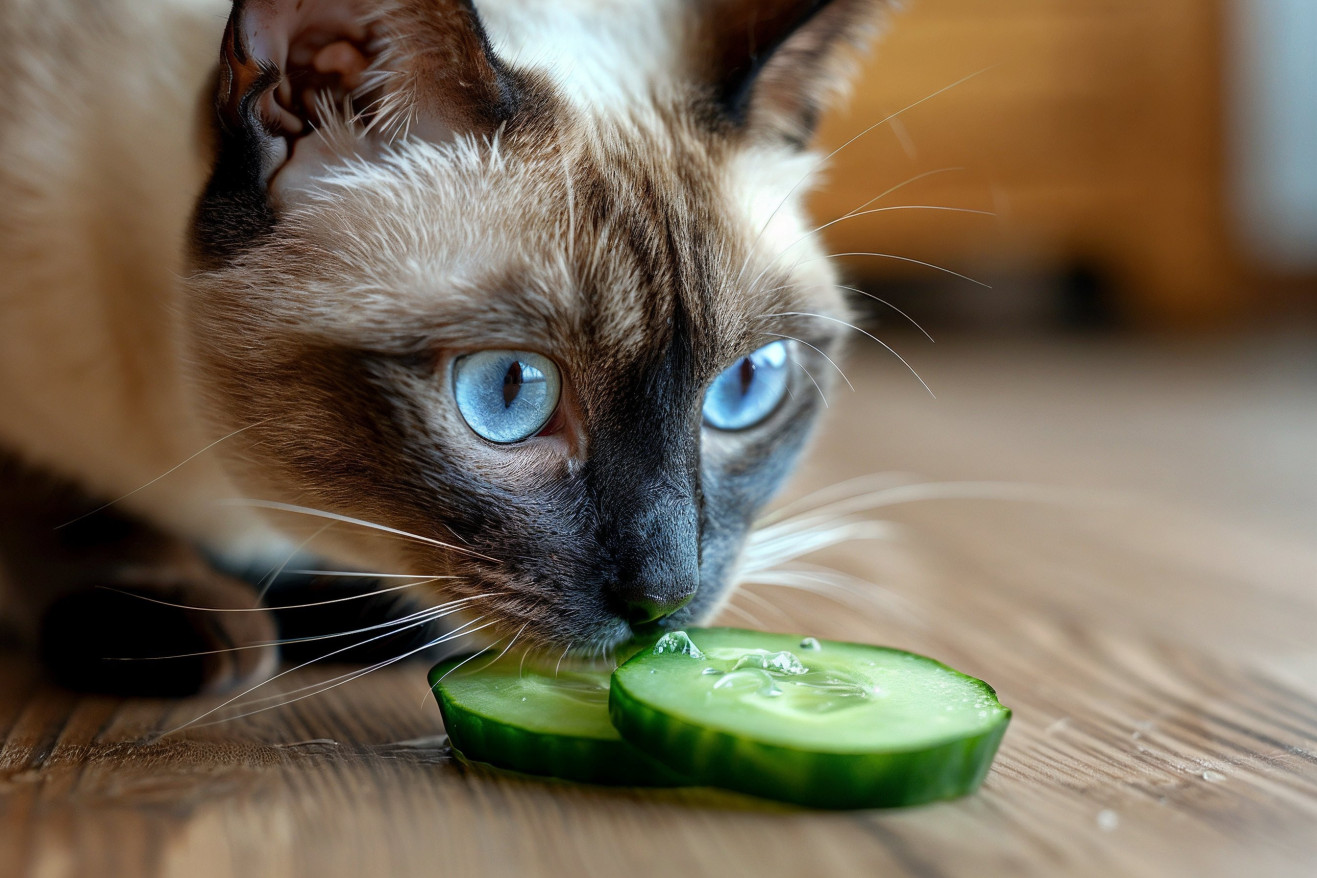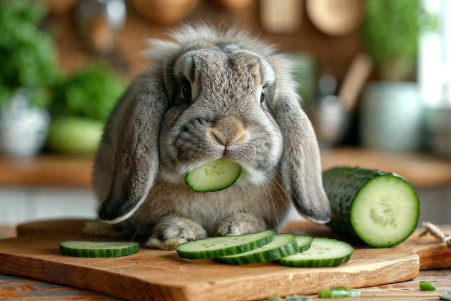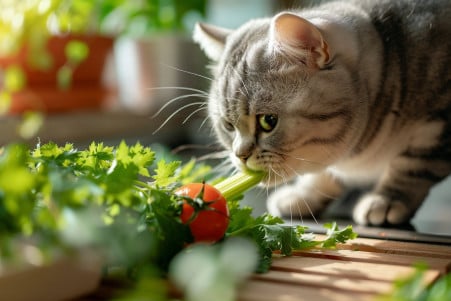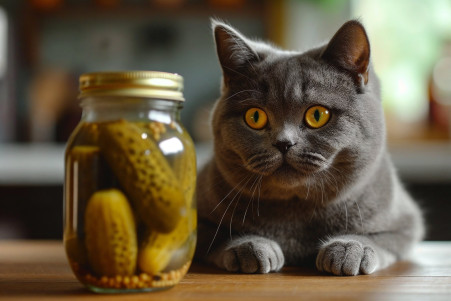Can Cats Eat Cucumbers? What to Know About Cat Nutrition and Safety
6 March 2024 • Updated 6 March 2024

While cats and cucumbers may not seem like a natural pairing, it is safe for cats to eat cucumbers in moderation. Cucumbers can be a healthy, hydrating treat that offers some vitamins, like vitamin K, and minerals, like potassium.
That said, cucumbers need to be prepared properly, which means they should be peeled, seedless, and free from any added salt or seasonings. It’s also important to note that cucumbers should not be used as a substitute for a nutritionally complete cat food.
This article will review the information from veterinarians and scientific research on cat nutrition and the feline digestive system to provide a comprehensive look at the role of cucumbers in a cat’s diet. We’ll cover the potential benefits and drawbacks of feeding cucumbers to cats, explain the specific nutritional needs of cats as obligate carnivores, and consider where non-meat foods like cucumbers fit into their diet.
With this information in mind, you can feel confident incorporating cucumbers into your cat’s diet as a treat that supports their health and happiness.
Can cats eat cucumbers?
Cucumbers: A Cool, Hydrating Snack for Your Cat
Cucumbers can be a cool, hydrating snack for cats, especially in the summer, since they are made up of about 95% water. In addition to their hydrating properties, cucumbers also contain vitamins and minerals that can be good for your cat. According to BeChewy, cucumbers are a good source of important nutrients like Vitamin K, which helps with liver and blood clotting functions, and potassium, which is important for muscle and heart function.
That said, cucumbers should be introduced to your cat’s diet in moderation. BeChewy cites Dr. Yvette Marshall, who says that treats, including cucumbers, should make up no more than 10% of a cat’s daily caloric intake. Overfeeding cucumbers can lead to digestive problems and nutritional imbalances, especially since cats are obligate carnivores.
Catster notes that it’s important to peel cucumbers before feeding them to your cat to avoid pesticide residue.
In addition, make sure the cucumber is seedless, and don’t feed cats cucumber leaves, which are toxic.
Start with a small amount, such as one or two slices a week, to make sure your cat doesn’t have an allergic reaction or digestive issues. This will help ensure that your cat can enjoy this hydrating snack without any negative consequences.
By following these recommendations, you can make sure that your cat’s diet stays in balance, meeting their nutritional needs while still allowing for the occasional treat.
The Carnivorous Nature of Cats
The fact that cats are obligate carnivores means that they need a diet that is high in protein and certain nutrients that can only be found in meat. According to the Cornell University College of Veterinary Medicine, cats need animal-based proteins and amino acids like taurine, and a lack of these nutrients can cause serious health problems.
High-quality commercial cat foods are designed to meet these nutritional requirements, providing the right balance of proteins, fats, and low levels of carbohydrates.
That said, the fact that cats need animal-based nutrients means that cats can’t eat cucumbers and other plant-based foods.
While cats don’t need cucumbers for their nutritional needs, they can be a good low-calorie treat that can help with hydration and provide some extra nutrients in moderation. VCA Animal Hospitals suggests that treats like cucumbers should make up no more than 10–15% of a cat’s daily caloric intake to avoid nutritional imbalances and ensure that cats get the nutrients they need to stay healthy.
It’s important for cat owners to understand the specific nutritional needs of cats so that they can make sure their pets get the care they need. While cucumbers can be a healthy and enjoyable treat for cats, it’s important to remember that they should be part of a cat’s diet rather than the basis of it, which should be a well-balanced diet of commercial cat food.
This information can help cat owners make sure they’re meeting their pets’ dietary needs while also catering to their natural carnivorous instincts.
How Cats’ Digestive Systems Work: Can Cats Eat Cucumbers?
Cats have a digestive system that is well-suited to processing a diet that is high in animal products. As obligate carnivores, cats have a digestive system that is optimized to digest and absorb proteins and fats.
According to the Veterinary Teaching Hospital at Washington State University, the feline digestive system includes the mouth, teeth, salivary glands, esophagus, stomach, intestines, pancreas, liver, and gall bladder, all of which work together to digest the food that cats eat.
When it comes to plant-based foods like cucumbers, cats digest them differently than the animal-based foods they are used to eating. While cucumbers are high in water and can help with hydration, cats’ digestive systems are not set up to extract many nutrients from these types of foods.
According to the Merck Veterinary Manual, feeding cats foods that their digestive systems aren’t equipped to handle, like too much plant material, can lead to digestive issues like gastroenteritis or colitis.
Cats can digest cucumbers, which are low in calories and not poisonous, in moderation. The fiber in cucumbers may be hard for cats to digest if they eat too much, but this is easily avoided by feeding them to cats in moderation. Knowing this, cat owners can feel free to give their cats cucumbers as a treat without throwing off the balance of their cat’s carnivorous diet.
Plant-Based Perils: Why Cats Eat Plants
The fact that obligate carnivores like cats eat plants is a bit of a mystery, especially since cats have evolved to eat a diet that is almost entirely meat. A study on PubMed notes that plants are part of the diet of many felid species and suggests that smaller cats eat plants to offset the energy costs of parasites and to maximize energy intake.
However, cats’ physiological and morphological adaptations are geared toward animal prey, not plant tissues that are high in cellulose.
As Raw Fed and Nerdy explains, cats need nutrients that come from animals, but they can ferment fiber, which means they can get some nutrition from plants. Meanwhile, studies on multiple species that are also published on PubMed suggest that the behavior’s adaptive significance may be related to self-medication, hairball removal, or surviving when food is scarce.
Cucumbers, which are non-toxic and mostly water, are a safe way for cats to get the hydration benefits of a plant. When fed in moderation and as an occasional treat, cucumbers can provide a tasty change of pace without causing major health problems. This way of feeding cats can be seen as a compromise that respects their carnivorous nature while allowing cat owners to give their pets a more varied diet.
Managing Cucumber Allergies in Cat Diets
Although rare, cats can be allergic to a variety of food items, including some vegetables. The Cornell Feline Health Center explains that skin issues and gastrointestinal problems, like vomiting and diarrhea, are the most common ways that food allergies show up in cats.
While cucumber allergies are not common, it’s important to be aware of the potential for an allergic reaction when introducing any new food to your cat. Signs of an allergic reaction can include itching, skin lesions, or digestive upset.
The Clinical Nutrition Service at Cummings School of Veterinary Medicine at Tufts University explains that while food allergies are less common causes of skin and gastrointestinal issues in cats, they can still occur. If you think your cat may have a food allergy, the experts recommend a dietary elimination trial.
This trial involves feeding your cat a novel protein and carbohydrate source that it has never eaten before. This will help you determine exactly what your cat is allergic to.
When you introduce cucumbers, it’s important to watch your cat for signs of an allergic reaction. If you see signs like constant scratching, skin redness, or changes in your cat’s poop, contact your vet. If your cat does have an allergic reaction to cucumbers, remove them from your cat’s diet and contact your vet for advice on how to treat your cat.
Closing Considerations: Cucumber Consumption for Cats
In conclusion, based on our investigation into cucumbers and cats, it seems that if fed properly, this popular vegetable can be a safe, hydrating snack. Cucumbers can help with hydration and provide important nutrients, so they can be a good addition to a cat’s diet in small amounts.
However, it’s important to make sure cucumbers are peeled to avoid pesticides and to stay away from the leaves, which are toxic, in line with the advice of experts and the information from BeChewy and Catster.
That said, it’s still important to remember that cats are obligate carnivores, so the focus should always be on moderation and making sure that any treats like cucumbers don’t interfere with a cat’s regular diet. In fact, the guidelines from VCA Animal Hospitals note that cucumbers and other treats like them should make up no more than 10% of a cat’s daily caloric intake to avoid digestive and nutritional issues.
So, while the occasional cucumber snack can help cats get the hydration and enjoyment they need, it’s important to remember that a cat’s diet should always be based on a balanced, meat-based diet.
Pet parents should always talk to their vets before making any changes to their cats’ diets to make sure that they’re doing what’s best for their cats’ health and well-being. With this information in mind, we hope that cat parents will be able to make choices that will help their pets live their best lives.


